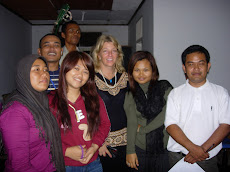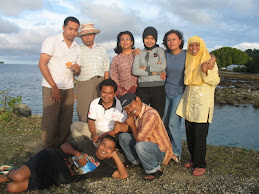Mandailing Batang Gadis National Park (TNBG):
Protecting Environment or Killing Villager’s Livelihood
Abdul Rozak Tanjung
Center for Strategic Governance and Development Studies.
Introduction
The Government of Mandailing Natal Regency has been campaigning Environment Awareness in its region since 2003 notably by establishing Batang Gadis National Park as well as by legalizing regulation concerning about Environment Awareness And Villagers Engagement in protecting environment. The policies follow the trend of several regencies and province throughout Indonesia. Furthermore, Saparuddin Siregar of Bitra Consortium--a local NGO that has been engagement on several agriculture, social and economic project and programmes in this area, claimed that as many as ten villages had been providing village regulation on environment issues in line with the regency policy (www, detik.com/ accessed on 14th June 2008).
Batang Gadis National Park (TNBG) is a national park lies in Mandailing Regency of North Sumatra Province, Indonesia. The park geographically lies on 99° 12’ 45" East Longitude to 99° 47’ 10" East Longitude and 0° 27’ 15" North Latitude to 1° 01’ 57" North Latitude. Up to 2005 the regency has 68 villages in 13 sub district. The name of the park is derived from a biggest river in this region namely Batang Gadis River. The park covers an area of 108.000 acres or approximately 26% of total area of the regency and lies at 300 to 2.145 meters above sea level. Sorik Marapi is a mountain in this park area which has plenty of flora and faunas.
Through Forestry Minister Regulation No.126/Menhut-II/2004, TNBG is legally stipulated as national park where the impact or budget consequences of the regulation must not only burdened to regency budget but also burdened to national budget. TNBG itself consist of reserved forest, limited productive forest and permanent productive forest. The governments also converted 101.500 Acre of reserved forest consisting of Register 4 Batang Gadis I, Register 5 Batang Gadis II komp I and II, Register 27 Batang Natal I, Register 28 Batang Natal II, Register 29 Bantahan Hulu and Register 30 Batang Parlampungan which have been legalized by The Dutch Government during colonial era in the beginning of 1920’s. However, as large as 5.500 acre of productive forest which was belongs to PT. Gruti and 1.000 Acre of PT. Aek Gadis Timber’s was converted to be reserved forest.
Forest and Villagers’ Blood of Economy
It has been generally known that natural resources mainly forest and fields are the “bloods” of villager’s economy in this area. It has come since they don’t have enough knowledge and capacity in searching other jobs like urban peoples who have plenty choices and preferences of finding jobs. The lack of knowledge or even experience makes them stuck living and keep trying to survive in this rural area. If they had enough education and experience, they would not live in this area but mostly would move to other regencies all over Indonesia.
The villagers mostly cultivate paddy field and kitchen garden and several extractive works ranging from making red sugar from sugar palm, making latex from rubber tree and finding rattan in the jungle. However, these activities have been reducing by time and decreasing the land and jungle potentials by uncontrolled illegal logging mostly undertaken by businessmen in 1990’s up to beginning of 2000’s. The villager’s jungle and forest have already destroyed by the capital owners where the villagers were able to witness the gigantic forest destruction only. These forests destruction contrarily have enriched the businessmen notably outsider and do not have right to own the forest.
What was the impact of forest destruction is not a difficult question to answer. Businessmen, government and villagers had known it but they had different interests when forest destruction through illegal logging happen. Businessmen needed capital accumulation in running their business; the government official took benefit by denying illegal logging and the villages need work and money to feed and clothe their children. It seems to be an imaginary circle beginning with starting point and ending without finishing point. However we obviously know that villagers are the only stakeholder without any choice.
After the forest has been damaged the villages are the only stakeholder having loss where they cannot take wood for building home, they cannot drink fresh water or they cannot catch fish for dinner meal, they cannot have enough paddy harvests to eat, they cannot have latex to sell. Aftermath, they will economically and politically be a vulnerable society. They will try to cheat the land owner when reporting their paddy harvests; they will try to steal their neighbors’ latex when collecting their latex and will easily brave to break the law. When the general elections come, they will sell their ballot for food; they will collect their identity card for taking political party T-shirt and will take away their independence by joining the richest leader candidate.
The businessmen will breed their money from illegal logging by buying assets and running financial game business. They obviously remain able to afford daily meal, to drink fresh water or buying luxuries goods. They will not absolutely influenced by the forest destructions. The government officials will wash their hand from this case. They will open a bulk of laws stipulating their innocents or even blame their leader instruction asking them to do so. Both businessmen and government officials are the winner in this game while the villagers are the looser.
TNBG and Villagers’ Livelihood
Who will be benefited by establishing TNBG National Park is the real question that easy to answer. The government bodies and officials as well as the businessmen are the parties having benefits from establishing the park. The government will be given so many projects and programme both from national government and international agencies. It’s not too difficult for them to just write proposal and asking fund from national and international agencies. Under green revolution and global warning project they can ask billion dollars for having several projects at this devastated area. The businessmen will be a contractor or implementer of the projects particularly in providing some space for ecotourism project.
It’s no wonder since right now the government prepares all regulation required in paving the way to make TNBG. As Saparuddin said above, ten villages have been making village regulations in implementing the regency regulation on the national park. Government elites at village level will be the liaison officers and implementer the regency policy at grass root level.
The nothing villagers will be a victim of this policy where they don’t have luck to engage this new game. Their land and field area will be reduced by national park borders. They did not know how to register their land to public notary as well as don’t know how to search and digest land reform concept and theories to be issued in rally and demonstrations. The only things they know are the land owner were their grandfather and the forest belongs to the god. The government official will easily answer their complaints by saying: We just implement the government rules and witness us your land certificate to claim the land. If you prohibit us to put the borders points we can report you to the police.






































Comment Form under post in blogger/blogspot